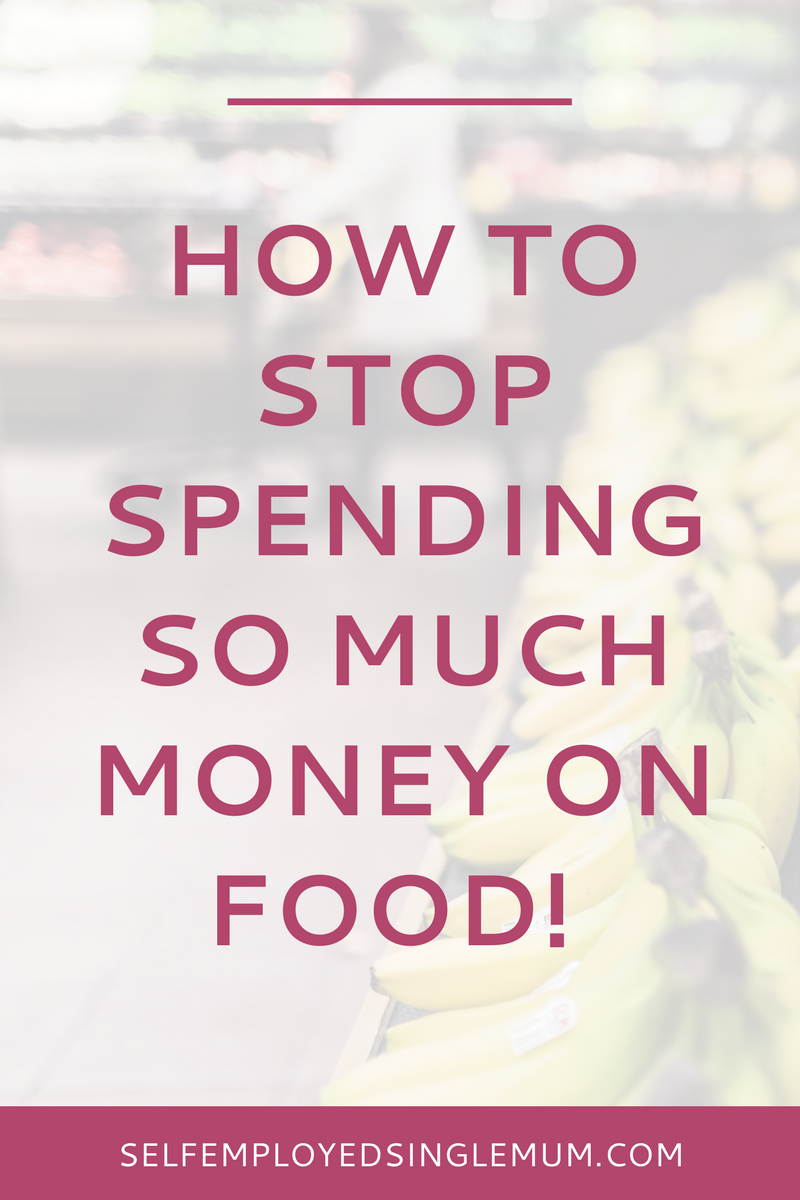How to save money on food shopping (the quick & simple way!)
 Feeding your family can be an expensive business. If you let it. But it’s one basic, essential, category of your budget that you can make considerable savings on. With a little bit of planning.
Feeding your family can be an expensive business. If you let it. But it’s one basic, essential, category of your budget that you can make considerable savings on. With a little bit of planning.
But don’t worry, this isn’t one of those posts encouraging you to spend hours of your week planning meals and making an inventory of every item in your kitchen cupboards. Who has time for that?
Yes, it does take a little bit of planning, but not more than your average busy single mum has time for. I managed it, so you can too.
And the little bit of planning you do at the start of the week stops you from having to worry about what you’re going to eat on a daily basis.
I used to spend ALOT on food. Before I worked for myself I never budgeted or planned what I was going to eat, I shopped ad hoc, whoever I noticed we were running out of things and popping out for a few bits would easily turn into spending £50 in Waitrose without even breaking a sweat.
Two years ago I realised I needed to rein in my spending if I wanted to survive as a self-employed single mum. My food shopping habits were one area where I realised I could significantly cut my outgoings.
I had to work out how to save money on food.
[label type=”default”]Related:[/label] 6 simple steps to financial freedom on a single income
Over the last year, I’ve spent an average of £35 a week on supermarket shopping. That includes household bits like toilet paper, washing liquid and basic toiletries etc as well as food. That’s only £1820 a year.
So how did I do it?
Firstly here’s what you’ll need:
- something to write a meal plan on.
- somewhere to keep a running shopping list
I recommend using a mini-whiteboard like this or this. Put it can put on your fridge where it’s easy to refer to and add things to.
- an online shopping account with one of the discount supermarkets. I shop at Asda because it’s close to home.
- an account with mysupermarket.com.
- a couple of recipe books with easy everyday meals.
1 | Keep a running list of things you need
Every time you notice you’re running out of something, or think of something you’ll need soon, note it down on your shopping list. If you keep this somewhere handy in the kitchen this is really easy to do as and when you think of things.
However unless it’s a staple like milk or eggs DON’T run out to shops immediately to replace it, wait until your week shop. Running out to the shops for odds and ends is a surefire way to overspend, so avoid it if you can.

2 | Plan your meals for the week
OK, this is where a little bit of boring planning and preparation comes in.
Meal planning sounds really rigid and obsessively organised but it doesn’t have to be. My way is the quick and simple way. And it really is the key to keeping your spending under control and reducing waste.
Keep a meal planning whiteboard on the fridge and every Sunday night do the following:
- make a note of evenings when you’ll be out or if can grab something from the freezer (we have pizza every Friday for instance – who wants to cook on a Friday!).
- jot down a meal idea for every evening of the coming week and any special meals or extra you’ll need e.g. if you’ve got people coming over or if it’s cake day at school (E’s class often get Asda cupcakes from me!).
- if you get stuck for ideas grab a couple of your favourite recipe books for inspiration.
- note when you also need to make yourself lunch so you can stock up.
- do a quick scan of your fridge and cupboards and add all the ingredients you need for the week’s meals to the list you’ve already been adding things to during the week (see above).
You don’t have to be rigid about your plan. Sometimes I fancy cooking something different, or I’ll end up cook what I’d pencilled in for Thursday on Monday. If you end up going out unexpectedly just freeze the meat or fish for the following week.
You can still be spontaneous and flexible without spending an extra BECAUSE you’ve got a fridge full of options waiting to be used.
3 | Do one big weekly shop and do it online
I order my shopping online but instead of getting it delivered I book a (free!) click-and-collect slot.
I hate the flippin’ awful lockers Asda has installed for click-and-collect but I like the convenience of being able to collect the shopping when I’m passing. I usually book a time that means I can collect my shopping after I’ve dropped E at school on Monday mornings.
Shopping online not only reduces the temptation to throw extra, non-essential, purchases into your trolley, it also means you can keep a close eye on your total spend and knock things off if you’re going over budget.
4 | Shop at a discount supermarket
Let’s face it we’d all much rather shop at Waitrose or Marks & Spencer, but if you’re on a budget that’s just throwing money down the drain.
Use mysupermarket.com to compare the cost of all the things you usually buy at all the big supermarkets. Then shop at the cheapest one that’s close to you.
When I did this I noticed that I could save £20 by shopping at Asda instead of Waitrose. I’m sure Morrisons or Aldi would be even cheaper, but they don’t have branches close enough to me to make it worth the extra effort.
5 | Buy own brand products
Buying own brand products instead of the more expensive branded alternative will save you a pretty penny over time.
I resisted this one for a long time and there are still some things I won’t consider swapping, like tinned tomatoes and peanut butter. But for many things –porridge oats, pesto, washing up liquid, dishwasher tablets (£1.60 a box!) – I don’t notice the difference, or not enough to warrant spending more.
6 | Make extra for lunches or to freeze for later
Buy an extra portion of chicken/salmon/whatever protein you’re having, cook it with your evening meal, and save it to have for lunch the next day. Just add a salad or pre-cooked bulgar wheat and you’re got a healthy lunch in minutes.
Or if you make freezer-friendly meals like spaghetti bolognese, chilli or soup make double and save the extra for lazy evenings when you don’t feel like cooking. This also comes in handy for weeks where you’ve already hit your monthly food budget.
It was a challenge to keep my spending within a very tight budget so this system is something I feel really proud of. It really worked for us.
Now I’m living with my mum I’ve got out of the habit of shopping like this and I miss it. Not only does it save you money but it also forces you to eat healthier and saves you time.
You don’t have to waste time thinking about what to eat every day, you get it all organised at the beginning of the week. With the basics of life taken care of, you can focus on more important things.